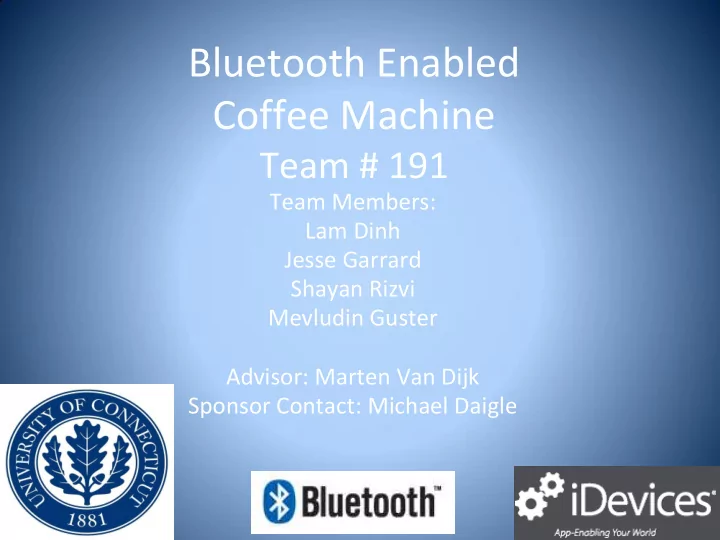

Bluetooth Enabled Coffee Machine Team # 191 Team Members: Lam Dinh Jesse Garrard Shayan Rizvi Mevludin Guster Advisor: Marten Van Dijk Sponsor Contact: Michael Daigle
Outline • iDevices • Our Project • Keurig Coffee Maker • Hardware and Microcontroller • Mechanical Aspect • Android Application
iDevices • Founded in 2010 • Located in Avon, CT • “Leaders in the development of app -enabled products and processes”. • Develops app-enabled products both independently and with partner companies.
Our Project • To Bluetooth-enable a coffee machine that will allow users the convenience of operating the machine from any location in its vicinity. • go.uconn.edu survey • Keurig Coffee Maker
Keurig Coffee Maker (B40)
Keurig Hardware Power Conditioning and Fuse Board Button Interface Board Main Board: Microcontroller
Approach Isolate our microcontroller and circuit from the Keurig circuit by using the Relay board to control the interface
Main Electrical Components • AVR Microcontroller Atmel 644 • Bluetooth Module (RN42) • Solenoid Valves • IR Sensor • BJT Transistors
Design Flowchart Solenoid Valve Relay Bluetooth App module Infrared sensor
Sensor • SHARP GP2Y0A41SK0F sensor has a range of 30cm • Packaged in this sensor are an infrared LED, a position sensitive detector and a signal processing circuit. • Outputs a voltage corresponding to a detection distance
Schematic
Microcontroller Functions • Program timer from AVR Microcontroller so user can select time to brew coffee • UART serial communication to send and receive data with the phone via Bluetooth • ADC peripheral is used for water level, and Infrared sensor • GPIOs control Solenoid, relay board • External interrupt to send signal to the phone to notify the user that machine is ready to brew
Mechanical Approach • Rotating design with stepper motor • Solenoid design
Mechanical Aspect • Choice of 3 K Cups • Solenoid Valves • Silicone Tubing (previously polypropylene) • Aluminum Structure (previously Lexan)
Solenoid Valves • 3 Parker Solenoid Valves • Normally Closed • 12 VDC/8 Watt • External Power Source • NPN transistor circuit
Software • Java • Communication via Bluetooth(API 5) • Minimum Froyo (2.2)(API 8) • Current KitKat(4.4) • Basic Layout • User friendly
Android Application • Power • kCup choice • Cup size (8oz, 10oz, 12oz) • Set time to brew • Stop/Cancel Brew • Coffee ready notification • Water level notification • Cup not present notification
New Design
Connecting to Devices • In-App Connections • Scan for devices • Pair with supported coffee makers • Connect to device • After connection, device name shows on top right.
Communication with Microcontroller • Successfully send and receive data over bluetooth • Send data through bytes • Microcontroller sends byte every second until app receives it and sends back confirmation. • Disables buttons if cup not present or water level low.
Communication
When Will This Work Occur?
Budget • Prototyping Cost < $700 • Final Product Cost < $300 • Expenses(so far) – 2 x $75.49 on Keurig – $22.04 on Stepper Motor – $30 on Bluetooth module (RN42) – $108 Electrical Components (Diodes, relays, AVR..) – $ 15.29 Lexand – $ 60 Additional Keurig Components – $ 70 Parts fabrication – $ 10 Tools – $ 64.47 Tubing and connectors – Total spent thus far: $530.78 • Remaining: $169.22
QUESTIONS?
Recommend
More recommend